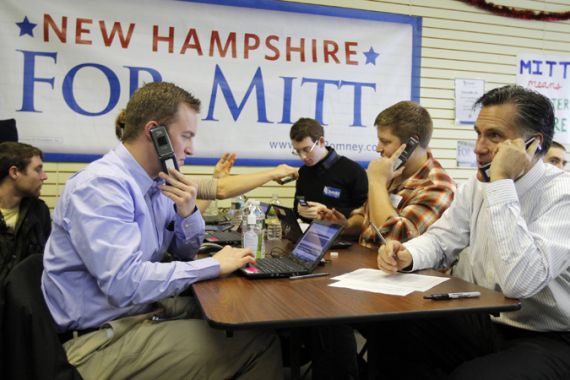New Hampshire set for Republican primary vote
Party members and independents to select presidential contender, as attacks continue on the front-runner, Mitt Romney.

Jon Huntsman, a Republican presidential hopeful, is gaining support in New Hampshire, one day before Tuesday’s crucial primary election, even though he still trails Mitt Romney, the front-runner, by a very large margin.
Also on the move in a new poll is Rick Santorum, the former senator who surged into fourth place from a base of almost no support in the northeastern state.
Shifting voter loyalties came as Republican contenders for their party’s nomination to run for US president squared off in two debates over the weekend, and staged a whirlwind of campaigning before the New Hampshire primary.
The new poll by American Research Group (ARG) showed Huntsman, a former US ambassador to China who has staked his hopes on a strong showing in New Hampshire, jumping into second place.
Romney, a former governor of neighbouring Massachusetts, had 40 per cent support in the survey of 600 likely Republican primary voters done on Friday and Saturday.
That was up from 35 per cent in the group’s previous poll in mid-December.
Behind Romney
Huntsman was second with 17 per cent – up from 13 per cent – while support for Ron Paul, the Texas congressman, slipped to 16 per cent from 21 per cent.
The ARG survey was done in the days after Huntsman was endorsed for the New Hampshire primary by the Boston Globe, Romney’s hometown newspaper, which is distributed widely in southern New Hampshire.
Santorum, who lost narrowly to Romney in this week’s Iowa caucuses, surged to 12 per cent from just one per cent in December.
Meanwhile, support for former Newt Gingrich, the former House of Representatives speaker, fell to eight per cent from 16 per cent.
Romney had a wide lead among New Hampshire’s registered Republican voters and also among those who considered themselves supporters of the conservative Tea Party movement.
Independents, who can vote in Tuesday’s primary, split their votes more evenly – 30 per cent for Romney, 24 per cent for Huntsman and 20 per cent for Paul.
Another survey, released on Friday by the Franklin Center for Government and Public Integrity, showed Huntsman with 16 per cent support from likely voters in New Hampshire, behind Romney at 37 per cent and Paul at 19 percent.
Al Jazeera’s Scott Heidler, reporting from New Hampshire, said: “It’s going to be Mitt Romney who comes out on top of these polls but there’s a horse race for other positions under Romney.”
State politics
New Hampshire’s primary was the first test for presidential hopefuls before the date of Iowa caucuses was moved up in 1972.
Critics of the primary in New Hampshire say it is arcane, unrepresentative and given undue media attention.
With a population of a little over one million, New Hampshire is one of the 10 least populated states in the country.
About 94 per cent of the population is white, the latest US Census shows, in a state not as liberal as some of its New England neighbours.
Defenders of the primary say it offers a true indicator of public opinion and acts as a leveler and winnower of the candidates.
But winners of the Granite state have had mixed success in getting their party’s nomination, a fact that raises questions
about the primary’s relevance.
John McCain won the Republican primary in 2000 but lost the bid to George Bush. In 2008 Hillary Clinton won the Democratic primary but the party’s choice went to Obama.
If Romney wins New Hampshire, he will be the first non-incumbent Republican to win both Iowa and New Hampshire since the 1970s.
Only 12 delegates are at stake in the New Hampshire primary, compared with 25 and 50 delegates up for grabs in the South Carolina and Florida primaries which follow.